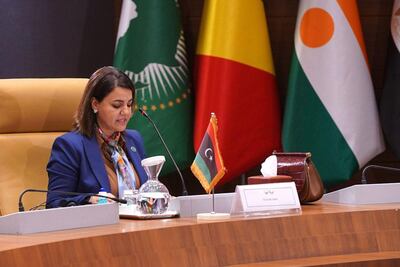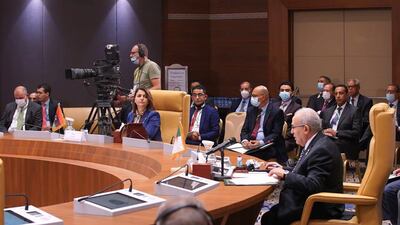Countries neighbouring Libya wrapped up a meeting Tuesday in Algeria with calls for foreign fighters and mercenaries to be withdrawn from the conflict-stricken North African nation.
“So far, we don't know where these illegal forces present in Libya will go. The most reasonable thing would be for those who brought these people into Libya to send them back out of Libya, to the places they came from," Algeria's Foreign Minister Ramtane Lamamra said.
"This is the way for us [Algeria] and the neighbouring countries to avoid also become victims of an unorganised and unsupervised withdrawal of those groups."
Participants at the two-day meeting also urged Libyan parties to stick to a political road map that ended hostilities last year and set parliamentary and presidential elections in December.
The meeting, hosted by Algeria, was attended by foreign ministers of Egypt, Tunisia, Sudan, Chad and Niger.
The UN envoy for Libya, Jan Kubis, Arab League Secretary-General Ahmed Aboul Gheit and a representative of the African Union also attended.
Mr Kubis said time was running short to prepare for the polls, after recent talks in Geneva exposed deep divisions over when to hold elections, what elections to hold, and on what constitutional grounds.
Following the session, Libya's Foreign Minister Najla El Mangoush said many points were discussed, including “the stability of the neighbouring countries, all the neighbouring countries are ready to support Libya towards its stability.”
She added that another meeting will take place at the end of next month, where the same participants are expected to attend.
Meanwhile, Ms El Mangoush on Tuesday refused to exclude the possibility that general elections set for December may have to be postponed if parliament delays the ratification of a new electoral law.
“As a government, we have put in place everything required to move towards elections, providing financial, logistical and material support to the elections commission,” she said in a news conference in Algiers, after meeting with Algerian officials.

“I cannot answer whether the elections will be postponed or not, but we are trying to ensure they will be held on the scheduled date” of December 24.
But “we are still waiting to see if parliament will approve the electoral law … this could block or postpone the election,” Ms El Mangoush added.
Libya has been wracked by chaos since a Nato-backed uprising toppled longtime dictator Muammar Qaddafi in 2011 and split the country between a UN-supported government in the capital, Tripoli, and rival authorities loyal to commander Khalifa Hifter in the east.
UN-sponsored peace talks brought about a ceasefire and installed an interim government that's expected to lead the country into a general election in December.

